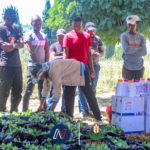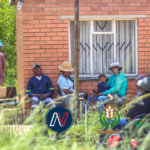The Food and Agriculture Organization (FAO) recently held a two-weeks training in Maseru aimed at capacitating the Bureau of Statistics (BoS) on compiling and analysing the national Food Balance Sheet (FBS)—a critical statistical framework that captures the total volume of agricultural commodities produced across all sectors.
This inaugural training workshop, funded by the FAO and facilitated by Dominque Habimana, marks a significant step forward in Lesotho’s efforts to collect comprehensive food and agriculture data for policy-making.
Habimana, who specialises in helping African countries design and implement data collection systems that inform agriculture and food security policies, emphasised that the FBS provides a detailed picture of food supply and utilisation trends over a specified period.
‘Mathabana Kotelo, FAO’s Communication Specialist, highlighted the significance of this initiative saying; “FBS provides a cost-effective, quick, and precise projection of food availability and the agricultural sector situation in the country. It further shows the trends in overall national food security supply and changes in dietary patterns. It reveals the extent to which the food supply of the country is adequate in relation to nutritional requirements.”
The FBS framework is lauded for its ability to integrate data from diverse sources—production, trade (imports and exports), and consumption—into a single comprehensive tool.
“The ability of the FBS to bring data from various statistical sources into one framework makes it a universal tool. For example, frameworks exist to collect data on food production or trade, but FBS combines them, helping detect imbalances and inconsistencies in the food security value chain,” explained Habimana.
He further added that FBS enables the identification of data gaps and provides estimates of food available for human consumption, incorporating difficult-to-measure nutrients like kilocalories, minerals, fats, and proteins.
“A developing country like Lesotho being able to generate such data sets contributes a great amount of data input that influences evidence-based policy formulation around agriculture and food security in the country,” he said.
Traditionally, Lesotho has relied on commodity balance frameworks focused mainly on cereals and field crops. While these inform trade policies, they fall short in providing a full picture of national food security.
“The commodity framework usually influences trade policies but does not allow countries to have comprehensive data on food security and availability, therefore, FAO is supporting Lesotho and other African countries to optimise the FBS methodology for better data,” Habimana said.
This training comes as FAO celebrates 80 years of existence, with the Food Balance Sheet remaining one of its flagship methodologies for advancing global food security.
According to Habimana, the framework will be an instrumental tool for the Lesotho government to improve data collection and policy-making.
“Our expectation after the first exercise is that as the country gets new production data in the coming years, Lesotho will compile an annual food balance sheet. FAO is always ready to provide technical assistance—either physically or remotely—to ensure regular updates.”
For Tšiliso Mosoaboli, a senior statistician at BoS under the Ministry of Finance and Development Planning, the training was eye-opening.
“I realised that I had been assuming the commodity balance sheet compensates for the food balance sheet. I was mainly focusing on sorghum, wheat, and maize, and thought that meant there was food in the country. Now I know that the food balance sheet encompasses all food commodities essential to food security, such as potatoes, meat, and vegetables.”
However, Mosoaboli also noted the technical nature of the framework and the need for upskilling.
“Compiling the FBS framework requires knowledge of computer software like Microsoft Excel. Therefore, short courses on computer literacy may be necessary.”
FBS outputs are also critical for tracking Sustainable Development Goals (SDGs), particularly indicators 2.1.1 (Prevalence of Undernourishment) and 2.1.2 (Prevalence of Moderate or Severe Food Insecurity).
These statistics, according to Habimana, will allow the government to understand how many people are suffering from hunger and aid in resource allocation. The FBS will also provide projections on post-harvest losses—an ongoing challenge in Lesotho’s agricultural value chain.
“Lesotho, like many developing countries, faces challenges in producing quality data due to financial and skills limitations. This affects the timeliness and accuracy of the FBS report. Additionally, informal cross-border trade remains difficult to measure, risking over- or underestimation of national food availability,” he said.
Another challenge lies in inconsistent data collection from different institutions.
“For instance, the Ministry of Agriculture, Food Security and Nutrition has a data collector at the Maseru Border Post, while the Revenue Services Lesotho (RSL) has another one. Since they are not stationed together, they often report inconsistent numbers,” Mosoaboli explained.
He added, “The workshop helped me realise that data collection standards must be aligned and that effective communication between representatives is crucial.”
Habimana stressed the need for governments to invest more in reliable and timely data collection, noting, “Viable and timely data collection is often overlooked in national development planning. We strongly recommend that the BoS, which coordinates national statistics using international standards, be supported both technically and financially.”
He added that the FBS will promote greater collaboration between ministries and institutions, ensuring clear communication of national production and trade realities.
“Weak data collection compromises the ability to formulate effective evidence-based policies. From a policy engagement standpoint, lacking quality statistics impedes effective programming. From a statistical viewpoint, inaccurate data leads to policies based on misinformation thus wasting resources,” he warned.
‘Mabatebang Napo, Assistant Nutrition Manager from the Ministry of Agriculture, Food Security and Nutrition, agreed that timely food data is crucial for nutrition programming.
“Reliable data on agricultural food production provides a clear picture of the current food security and nutrition status in the country,” she said, adding, “The FBS will align with current food supplies, enabling us to accurately address issues like malnutrition.”
She added that dietary diversity, a key feature of the FBS, has a major impact on national strategy planning.
“This calls for our projects to meet statistical methodology standards in line with those of participating ministries and institutions.”
Napo concluded by emphasising the importance of inter-institutional collaboration.
“Data integration is essential in producing reliable results. Strengthened collaboration ensures data integrity as all institutions adopt uniform statistical methodologies. This, in turn, enables planners and decision-makers to utilise key variables such as production quality and trade effectively.”






